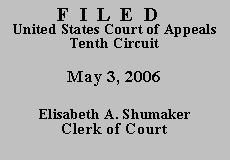

| ELENA DVORKINA, |
|
| v. | |
| JEWISH COMMUNITY CENTER (JCC); ANNE CINER, in her capacity as Director of the Early Childhood Center, |
Dvorkina was hired by the JCC in 1995 as an assistant teacher in its Early Childhood Center ("ECC"). She alleges she was forced to resign from that employment in 2001. After filing an administrative charge of discrimination with the Colorado Civil Rights Division, Dvorkina ultimately filed this action, alleging: (1) the JCC discriminated against her because of her national origin, in violation of Title VII, 42 U.S.C. §§ 2000e to 2000e-17; (2) the JCC retaliated against her for complaining about discrimination, in violation of Title VII; (3) the JCC discriminated against her because of her national origin, subjected her to a hostile work environment and retaliated against her, in violation of the Colorado Anti-Discrimination Act, Colo. Rev. Stat. § 24-34-402; and (4) that Anne Ciner, the director of the ECC and Dvorkina's supervisor, tortiously interfered with her employment contract with the JCC.
Defendants, the JCC and Ciner, filed a motion for summary judgment on all of Dvorkina's claims, arguing the undisputed facts showed defendants were entitled to judgment as a matter of law. The matter was referred to a magistrate judge, who issued a fifty-five page Recommendation for Dismissal recommending that defendants' motion for summary judgment be granted. Dvorkina filed objections to the Recommendation, and defendants filed a response to those objections. The district court subsequently issued an order affirming and adopting the magistrate judge's Recommendation, entering summary judgment in favor of defendants, and dismissing all claims against them with prejudice. This appeal followed.
For substantially the reasons set forth in the magistrate judge's thorough Recommendation, subsequently adopted by the district court, we affirm the grant of summary judgment for defendants on all claims. We address, however, two arguments Dvorkina makes about the Recommendation and the district court's adoption of the Recommendation.
Dvorkina first alleges that the magistrate judge engaged in fact-finding in granting summary judgment, rather than relying on undisputed facts, and failed to examine the record and the reasonable inferences to be drawn therefrom in the light most favorable to the non-moving party, in this case Dvorkina. To avoid summary judgment, "[t]he plaintiff must 'go beyond the pleadings and designate specific facts so as to make a showing sufficient to establish the existence of an element essential to that party's case.'" Self v. Crum, 439 F.3d 1227, 1230 (10th Cir. 2006) (quoting Sealock v. Colorado, 218 F.3d 1205, 1209 (10th Cir. 2000)). Further, "'[t]o defeat a motion for summary judgment, evidence, including testimony, must be based on more than mere speculation, conjecture, or surmise.'" Id. (quoting Bones v. Honeywell Int'l, Inc., 366 F.3d 869, 875 (10th Cir. 2004)). Thus, "'unsupported conclusory allegations . . . do not create a genuine issue of fact.'" Arnett v. Univ. of Kan., 371 F.3d 1233, 1237 (10th Cir. 2004) (quoting L & M Enters., Inc. v. BEI Sensors & Sys. Co., 231 F.3d 1284, 1287 (10th Cir. 2000)). We are satisfied, upon review of the record, that the magistrate judge relied upon either undisputed facts or facts as to which Dvorkina presented no contrary evidence or no evidence to support her claim that they were disputed. Additionally, the magistrate judge's Recommendation appropriately applied all other summary judgment standards to the record before it.
Dvorkina also argues that the district court failed to conduct a de novo review of the magistrate judge's Recommendation before adopting it. We disagree. As indicated, Dvorkina challenged the magistrate judge's Recommendation. When a party timely objects to a magistrate judge's recommendation, the district court must conduct a de novo review of the record. 28 U.S.C. § 636(b)(1); In re Griego, 64 F.3d 580, 584 (10th Cir. 1995); Bratcher v. Bray-Doyle Indep. Sch. Dist. No. 42, 8 F.3d 722, 724 (10th Cir. 1993). Indeed, in this case the district court expressly noted its obligation to review the record de novo. We presume the district court knows what is required and understands the nature of a de novo review. See Bratcher, 8 F.3d at 724. Dvorkina has failed to establish any evidence that the district court did not conduct the required review.
For the foregoing reasons, the decision of the district court is AFFIRMED.
ENTERED FOR THE COURT
Stephen H. Anderson
Circuit Judge
*.This order and judgment is not binding precedent, except under the doctrines of law of the case, res judicata, and collateral estoppel. The court generally disfavors the citation of orders and judgments; nevertheless, an order and judgment may be cited under the terms and conditions of 10th Cir. R. 36.3.